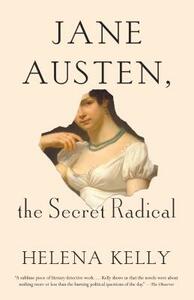Take a photo of a barcode or cover
informative
inspiring
reflective
slow-paced
informative
reflective
slow-paced
Very interesting, especially how the author connects Jane Austen’s works to the social and political events of the time when she wrote them (which is in most cases quite a bit earlier than when they were published).
challenging
informative
fast-paced
This book offered a completely new perspective on Jane Austen and her writing. It especially expanded my understanding of one of her least well liked novels, Mansfield Park.
challenging
emotional
informative
sad
medium-paced
challenging
informative
reflective
slow-paced
My English teacher gave me this book to borrow for a few days last year, and I only got to read the chapter on Pride & Prejudice and Emma before I had to give it back, but I was so intrigued that I bought my own copy of it (finally, almost a year later).
Many people view Jane Austen as light and bubbly; they associate her work with parlour room drama and Colin Firth in the 1995 BBC Pride & Prejudice series. But this book illuminates the fact that Austen wrote during a time when Britain was at war with France, and thus the country cracked down on creative works that dared to defy the government or challenge the status quo—in this context, it’s no wonder that the political messages in Austen’s work are fairly hidden, and that we have to look for them.
Most of us know that Austen highlights the inequality of marriage in her books, but Kelly links Pride & Prejudice to not only feminism but the French Revolution. There were many moments where I wanted to write ‘!!!!!’ in the margins of this book, particularly when Kelly underlined Austen’s criticism of slavery in Mansfield Park and enclosure in Emma (I can never look at Mr Knightley the same again). Even the fact that Austen may have been so meticulous in choosing her characters’ names that we can link the surname ‘Dashwood’ to how Austen wants to uproot the unfair system of primogeniture (whereby power and money is passed down the family tree to first sons only).
Although I had to skip the chapter on Northanger Abbey since I haven’t read it yet (but I’ve asked for it for my upcoming birthday…), I thoroughly enjoyed reading this enlightening book on one of my favourite authors. However, I cannot give it five stars because some parts aren’t the best, such as the passages at the start of each chapter in which Kelly writes about Austen’s life in a fictional, third-person narrative style (based on Austen’s letters) which somehow detracts from the serious tone of the rest of the book, and also the chapter on Persuasion which, although containing some good points about how Austen might have been challenging the Bible with regard to the scientific evidence of evolution, is not wholly convincing (see: “From Jane Austen to fossils is, really, just a step.”) Still, I would recommend this book if you enjoy Austen and want to examine the context and themes of her works in more detail, with a ‘radical’ lens.
Many people view Jane Austen as light and bubbly; they associate her work with parlour room drama and Colin Firth in the 1995 BBC Pride & Prejudice series. But this book illuminates the fact that Austen wrote during a time when Britain was at war with France, and thus the country cracked down on creative works that dared to defy the government or challenge the status quo—in this context, it’s no wonder that the political messages in Austen’s work are fairly hidden, and that we have to look for them.
Most of us know that Austen highlights the inequality of marriage in her books, but Kelly links Pride & Prejudice to not only feminism but the French Revolution. There were many moments where I wanted to write ‘!!!!!’ in the margins of this book, particularly when Kelly underlined Austen’s criticism of slavery in Mansfield Park and enclosure in Emma (I can never look at Mr Knightley the same again). Even the fact that Austen may have been so meticulous in choosing her characters’ names that we can link the surname ‘Dashwood’ to how Austen wants to uproot the unfair system of primogeniture (whereby power and money is passed down the family tree to first sons only).
Although I had to skip the chapter on Northanger Abbey since I haven’t read it yet (but I’ve asked for it for my upcoming birthday…), I thoroughly enjoyed reading this enlightening book on one of my favourite authors. However, I cannot give it five stars because some parts aren’t the best, such as the passages at the start of each chapter in which Kelly writes about Austen’s life in a fictional, third-person narrative style (based on Austen’s letters) which somehow detracts from the serious tone of the rest of the book, and also the chapter on Persuasion which, although containing some good points about how Austen might have been challenging the Bible with regard to the scientific evidence of evolution, is not wholly convincing (see: “From Jane Austen to fossils is, really, just a step.”) Still, I would recommend this book if you enjoy Austen and want to examine the context and themes of her works in more detail, with a ‘radical’ lens.
3.5 Stars
For someone who is well-versed in all of the Austens and has read them both for pleasure and academic study, there wasn't a great deal of new findings or arguments for me, but it was nonetheless exciting to see Kelly's arguments published in a commercial book
I think this book is perfect for bringing awareness to the fact that Jane Austen isn't all chinz as often portrayed in film and TV adaptations, and I will continue to argue the case until I'm blue in the face.
For someone who is well-versed in all of the Austens and has read them both for pleasure and academic study, there wasn't a great deal of new findings or arguments for me, but it was nonetheless exciting to see Kelly's arguments published in a commercial book
I think this book is perfect for bringing awareness to the fact that Jane Austen isn't all chinz as often portrayed in film and TV adaptations, and I will continue to argue the case until I'm blue in the face.
informative
medium-paced
Minor: Chronic illness, Death
slow-paced




